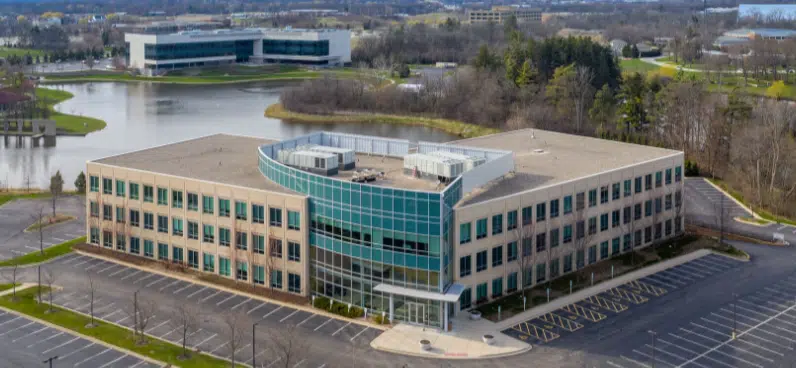The City Of Lake Forest’s Purchase & The Office Space Market
The Lake Forest City Council has recently approved a significant acquisition that could reshape its infrastructure and its role within the broader Chicagoland office market. The purchase of a vacant office building at 1925 Field Court in Conway Park for $3.5 million marks a strategic move to relocate the Lake Forest Police Department from its long-time headquarters on Deerpath Road. This decision is more than just a municipal transaction; it reflects the changing dynamics of the office market in Lake Forest and the wider region.
The Acquisition: A Strategic Opportunity
Lake Forest’s decision to acquire the 100,000-square-foot office building in Conway Park comes at a time when the real estate market is presenting unique opportunities. The building, which was appraised at $12.5 million in 2022, was acquired for just $3.5 million, highlighting a significant depreciation that aligns with broader trends in the office market. The city’s purchase reflects a keen awareness of the current state of office space in Lake Forest, where vacancies have become more common, and prices have softened.
The move to relocate the police department is driven by the inadequacies of the current facility at 255 E. Deerpath Road. City officials have recognized that the existing headquarters no longer meets the needs of a modern police force, necessitating a shift to a more suitable and expandable location. The new site at Conway Park not only offers the necessary space but also provides a cost-effective solution to the city’s infrastructure needs. However, the acquisition is just the beginning; extensive renovations estimated to cost between $24.48 million and $28.82 million will be required to transform the office space into a functional police headquarters.

The Broader Chicagoland Office Market Context
Lake Forest‘s acquisition comes at a time when the office market across the Chicagoland area is experiencing notable shifts. The rise of remote work, coupled with economic uncertainties, has led to increased vacancy rates in many suburban office markets, including Lake Forest. According to recent data, the overall vacancy rate for suburban Chicago office spaces reached approximately 26% in early 2024, with some areas experiencing even higher levels. This trend has been driven by companies downsizing their office footprints or relocating to more cost-effective regions.
However, Lake Forest stands out in this broader context. While vacancy rates have indeed increased, the area’s desirability due to its high-quality living standards, excellent schools, and proximity to major transportation routes has helped mitigate the impact. The city’s office market, particularly in areas like Conway Park, remains a sought-after destination for businesses looking for a prestigious address outside of the more congested downtown Chicago area.
The $3.5 million acquisition by the city can also be seen as a response to these broader market trends. By purchasing the property at a significant discount, Lake Forest is not only addressing its immediate needs but also positioning itself to take advantage of a future office market recovery. Should the demand for office space in the suburbs increase—as some analysts predict could happen as companies seek to establish satellite offices closer to where their employees live—the city’s investment could yield long-term benefits.
Financial Implications and Community Impact
The financial implications of this purchase and the subsequent renovation are substantial. The total cost of converting the office building into a police headquarters is expected to exceed $30 million, including renovation costs, ongoing capital maintenance, and everyday operational expenses. The city has identified several potential funding sources, including tapping into reserves, issuing bonds, and exploring public/private partnerships. However, these options carry implications for local taxpayers, with potential property tax increases depending on the chosen financing method.

The city’s Finance Director, Elizabeth Holleb, outlined the potential impact on taxpayers, noting that issuing either 10- or 15-year bonds could result in an annual tax increase of between $163 and $366 for an $800,000 home. This increase would be phased in over three years, starting in 2025, and could fluctuate based on future interest rates. While city officials are hopeful that interest rates will decrease, lowering the cost of borrowing, there remains some uncertainty around the final financial impact on residents.
In addition to the financial considerations, there are logistical and operational concerns related to the move. Some residents have expressed worries about relocating the police headquarters away from its current central location in Lake Forest to Conway Park, potentially leading to longer response times in certain areas of the city. Interim Police Chief Michael Lange has acknowledged these concerns but reassured residents that the department is committed to maintaining its high service standards. The department is continuously evaluating its operations to ensure that the move does not negatively impact the community’s safety.
The Future of Office Space in Lake Forest
As the city moves forward with the project, the future of office space in Lake Forest remains a topic of significant interest. The Conway Park area, where the new police headquarters will be located, is one of the city’s key office districts, home to numerous businesses and professional services. The adaptive reuse of the office building for municipal purposes is an example of how Lake Forest is navigating the challenges posed by a changing office market.
The city’s ability to secure a tenant for the remaining space in the building could also play a crucial role in the project’s financial viability. City Manager Jason Wicha expressed confidence that the city would be able to find a suitable tenant, which would help offset some of the costs associated with the renovation and ongoing maintenance. This aspect of the project highlights the importance of flexibility and adaptability in managing office space in today’s market.
The purchase and planned renovation of 1925 Field Court are emblematic of the broader trends affecting office space and commercial real estate in Lake Forest. As the city continues to grow and evolve, its ability to adapt to changes in the office market will be critical to its long-term success. For those interested in how these developments might impact the local real estate market, our Commercial Real Estate Agents In Lake Forest are available to provide insights and guidance.
Whether you are a business owner looking for office space, an investor considering opportunities in Lake Forest, or simply a resident curious about the future of your community, the acquisition of 1925 Field Court is a significant event with far-reaching implications. Reach out to our Commercial Real Estate Agents In Lake Forest to learn more about how this project fits into the broader context of the Lake Forest office market and what it could mean for you.


